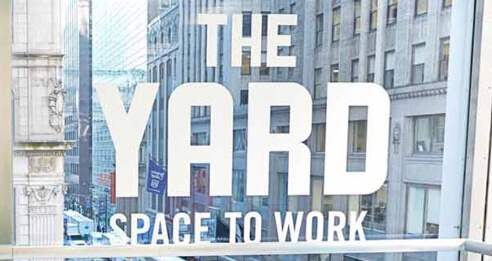
Largest Coworking Companies


Good news — coworking is mainstream! But mainstream success has unearthed a serious underlying issue that is affecting coworking communities around the world.
You are undoubtedly proud of the community that you've created. And you should be. They're a group of talented and respectful people who are working individually and cooperatively on solving the world's problems. Maybe you've had some issues, maybe not. But either way, your community is constantly in motion, constantly adding new members who will expand the possibilities of your space.
In this environment, it is essential to have a strong, clear, and accessible Code of Conduct. It should outline your core community standards, provide guidance, and offer feasible and tangible ways in which it can be enforced.
As the famous saying goes, the best time to start was yesterday. The second-best time is today. There have been several high-profile harassment and discrimination cases where there was no clear documentation or action plan on the part of the coworking space — and you have it in your power to avoid (or at least minimize the odds of) this situation happening. One of the best ways to show your community that you care about their well-being is to have a reference point that every member can point to if they ever wonder what sort of workspace they're a part of.
One of the biggest pushbacks I've heard when discussing codes of conduct is that they are a form of micro-management and difficult to implement. Some spaces take pride in the fact that they don't need a codified list of rules and regulations in their space. I understand the feeling. Living and working in the coworking world can be an incredible experience; when you start trying to write down what makes your space special, it can feel like you're losing the magic. That said: You should still write down a Code of Conduct, or another document outlining the same information. But why?
A code of conduct isn't about constraining your community; it's about giving them (and you!) peace of mind. You would be horrified if someone told you they felt uncomfortable in your space. But many of the people in coworking spaces who are harassed or feel uncomfortable don't come forward and talk to anybody, they simply leave. And they have good reason to be skeptical: Oftentimes their concerns are minimized or they are dragged through a public reckoning, because their space didn't have a clear policy or enforcement guidelines.
As Alex Hillman of Indy Hall so eloquently put it when he instituted a Code of Conduct:
"And already, having this document has opened the door for valuable conversations with members about issues they’ve had. I’ve never been so naive as to think that these issues weren’t happening, but I think I mistakenly expected people to just come talk to me if they did. Knowing that the Code of Conduct may have played a small role in people feeling comfortable asking for help – or even just knowing they can come to someone in confidence."
So give them a reason not to worry!
Coworking spaces almost always start as personal projects. During the early days, it's common to know every member on a first name basis. As the space grows, your positive coworking culture is a strength (and a selling point), but it is also fragile. It only takes a handful of bad experiences and one botched response to leave a deeper scar. Stories of poorly-handled complaints and disrespectful members can become permanent stains by virtue of the fact that online complaints never fade, they will always be connected to your space's online identity.
But fear not: You don't want to, and don't need to, police your members' behavior.
Write down what's important! It doesn't have to be entirely focused on what could go wrong (another common misconception). You probably value the ways that your members help each other; the way that anyone can run a workshop, meetup, or seminar on their passion; and the way that coworking can bring us out of our bubble and into a wider world. Whatever you feel are central characteristics of your space, go ahead and codify them. When a prospective member is being onboarded, they'll have an idea of how they can positively contribute to the space from the get-go.
Blogger and independent journalist Jillian Richardson once wrote about her experience facing harassment in a coworking space, and how it impacted her future desire to return there, or to find a new space.
"It’s frustrating to know that I may get cat-called on my way to work, only to walk into a professional space that makes me feel just as unprotected."
Now imagine how many potential coworking members are hesitant to dive into coworking out of this (justified) fear?
There is a growing movement amongst participants to avoid events and community organizations that don't have a code of conduct. Many prospective members are skeptical of putting their trust in an organization that doesn't take their well-being seriously enough to put it in writing. For these members, not having a code of conduct is a deal-breaker.
The flipside of this is that having a well-thought-out code of conduct says to prospective members that they will be taken care of, and on the off-chance that they find themselves in need of support, they will find it in your leadership.
Coworking Space Management Guide
A comprehensive guide to help you manage your coworking space.
DownloadA useful code of conduct incorporates several distinct elements. The first is a rundown of what your values are and what purpose the code serves. Here's where you can lay out your grand vision for your community. What would make you proud if you heard about it happening? Think collaboration, support, participation, and positivity.
Next, come up with a list of unacceptable behaviors in your space. You don't have to list a specific action, but rather the broad categories that cover the ways in which people might create an unwelcoming atmosphere, either intentionally or unintentionally. Things like: inappropriate jokes, repeatedly "asking someone out" after rejections, or encouraging other people to engage in unacceptable behavior. If you're worried that there's a category that you're missing, you can always reach out to valued members of the community to see what they would find unacceptable in the space.
The last element you need is a guide for what to do if a member feels that the code hasn't been followed, and in that case, what steps your space will take. This is the part that is most often forgotten about, but is potentially the most practical and useful part of the document. If someone goes to a community manager and confides that they were subject to harassment, what happens next? Ideally, you want to lay out a fair process that doesn't let anyone feel like they don't understand how you arrived at an outcome. The more comfortable your members are in reporting what makes them uncomfortable, the less you'll have to worry about problems hiding out of your sight.
You can look for resources on the always fantastic Global Coworking Wiki and Forum. There, you can read (and ask!) other experts' opinions. A number of people have discussed the ways that they've incorporated codes of conduct into their space. And if you've got a particular question, there's bound to be someone who can give you advice and guidance.
There are many articles that focus on what you need in a code of conduct, although sadly, most are not directly targeted at coworking spaces. Here's one from Project Include, an organization working toward equality in tech. There are also open-source resources available to adapt.
Existing codes of conduct can be used for inspiration, like the above mentioned Indy Hall code of conduct.
And when you're putting this together, don't forget to incorporate your members' feedback. They'll be the ones responsible for upholding the values, and the ones who may need to rely on the code for resolution, action, or guidance.
Now that you've read all this, I know you're itching to get to work crafting your very own code of conduct—I look forward to seeing what you come up with!
Sam Bender is the Communications Specialist at Cobot, the leading software for coworking spaces worldwide; and a member of the team that published the Coworking Code of Conduct, a free-to-use document meant to help coworking events easily adopt a code of conduct.
Save your community manager 41 hours each week—learn how The Yard did it with cloud-based access control.
Read the Case StudyFree access to our best guides, industry insights and more.
